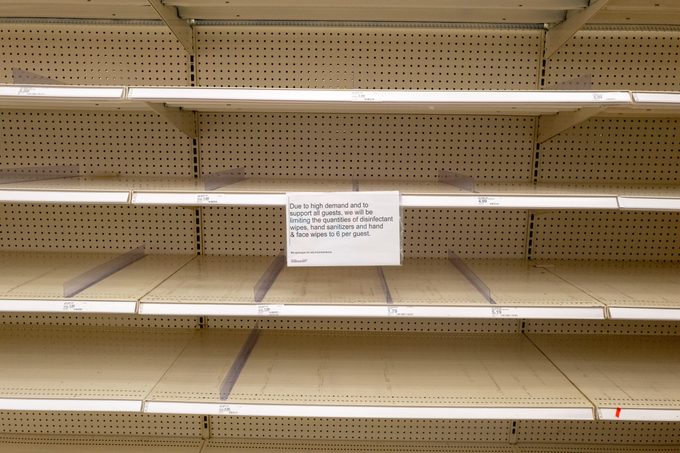Don’t Become a Victim of Coronavirus Shopping Frenzy
Updated: Jul. 14, 2021
Coronavirus is causing worldwide worry. Here in America, it’s also spurring high prices, empty shelves, long lines, and full shopping carts.

In light of coronavirus concerns, Americans are buying cleaning products and household supplies in bulk. And the effects are striking.
- Retailers like Target have started limiting quantities of certain products.
- Bath & Body Works has notified its shoppers that hand sanitizers are selling fast online, so they should go to a local store or check back.
- Third-party sellers on Amazon have been accused of jacking up prices of surgical masks and hand sanitizers. In some cases, prices spiked by at least 50 percent compared to the 90-day average price, according to a recent analysis by S. PIRG Education Fund.
From the outside, it appears coronavirus is reshaping shopping behavior. But does that mean you should adjust yours, too?
Don’t shop just because you think you should
“Unfortunately, the psychology of this whole disease has kind of changed the way people think in regards to buying things,” says Patrick Penfield, professor of supply chain practice at the Martin J. Whitman School of Management at Syracuse University.
“In their minds, they want to buy more to protect themselves.”
The higher retail prices for personal health items such as hand sanitizers are largely being triggered by this higher consumer demand, according to Christopher Newman, associate professor of marketing at the University of Mississippi.
He believes some people are basing their purchases on media coverage as well as other consumers’ behaviors.
“Nearly constant exposure to videos and pictures of other consumers frantically buying supplies in bulk scares many into doing the same,” Newman said, in an email.
Higher costs accompanying these in-demand products are normal. But some people are trying to profit off of the frenzy, buying products and selling them for outrageous prices through online marketplaces.
“When there is more demand, typically what will happen is prices will go up,” Penfield says. “In this particular case, I don’t think they’re going to go up too much with the actual producers themselves. I think it will be the places where people think they can make money based on shortages.”
Tip: Don’t spend $100 on a hand sanitizer. If you really need one, consult other retailers to see how prices compare. U.S. PIRG Education Fund recommends using price-tracking tools like CamelCamelCamel to check a product’s price history. This will inform you if a product’s price has rapidly increased.
Don’t worry about buying everything right now
Contrary to how it may look, the world won’t be out of hand sanitizer forever, according to Darrin Duber-Smith, a senior lecturer of marketing at Metropolitan State University of Denver. Or toilet paper, for that matter.
The products that are running low or selling out on shelves right now were actually manufactured months ago.
“This stuff is ordered six months out,” Duber-Smith says.
Right now, he assumes toilet paper, tissue paper, and hand sanitizer companies are working around the clock to make new supplies. But they need to buy the raw materials first, so there’s a lack of inventory in the interim before excess quantities are manufactured.
“A shortage happens in between the time when the disaster happens,” he says. “All of those currently made supplies are used up, and then it takes about two months or so for all of the companies to order all of their materials and ramp up manufacturing.”
That can lead stores to ration. Duber-Smith says it’s similar to a wartime measure. And it allows more people to get the items they need. For example, 50 people could get 1 bottle of hand sanitizer each, instead of 1 person buying the whole shelf and leaving 49 people to pay $100 a bottle from a third-party seller online.
Tip: Be considerate. When you do find disinfectants or other supplies, be mindful of others. “It’s about availability,” Penfield says. “If you see something, buy what you need, but don’t buy more than what you need. Especially because somebody else could use it.”
Don’t leave yourself unprepared
For many Americans, it’s still possible to go to the store as needed and shop like normal.
But for at-risk groups, the prospect of staying home for a prolonged period of time has become more of a reality, which could make routine shopping trips difficult. The Centers for Disease Control and Prevention advises those over age 60 to be prepared with medicine, household items, and groceries.
Furthermore, the American Red Cross recommends helping family members and neighbors, especially those who are at a higher risk of getting very sick from the virus.
If you’re looking to buy supplies—because you are a member of a vulnerable group, you’re assisting someone who is or you’re limiting your own exposure in public—and are facing high prices or shortages, try places you don’t usually shop. If you can’t find certain items at supermarkets or big box stores, look at drugstores, office supply stores, or even home improvement stores (yes, they sell paper towels and soap).
Skip the items you don’t absolutely need so you aren’t wasting your time and money. Check with the CDC to see what’s recommended before you begin hunting for things.
And stay informed about your own risk. Follow the latest news from the CDC so you know how your area of the country is being affected by coronavirus.
Tip: Use this experience as an impetus to get prepared for any type of emergency or disaster that may happen in the future. “After the virus is contained and we resume our normal routines, people should consider putting together a small stockpile of necessities,” Newman said. “That way they’ll already be prepared when the next panicked rush of consumers hits retail stores—and even likely save some money in the process.”
More From NerdWallet
Mortgage Refinance Could Save Money — Even If Your Loan Is New
SmartMoney Podcast: ‘How to Save for a Down Payment’
How to Stock Up Wisely, Emergency or Not
Courtney Jespersen is a writer at NerdWallet. Email: [email protected]. Twitter: @CourtneyNerd.
The article Don’t Become a Victim of Coronavirus Shopping Frenzy originally appeared on NerdWallet.


